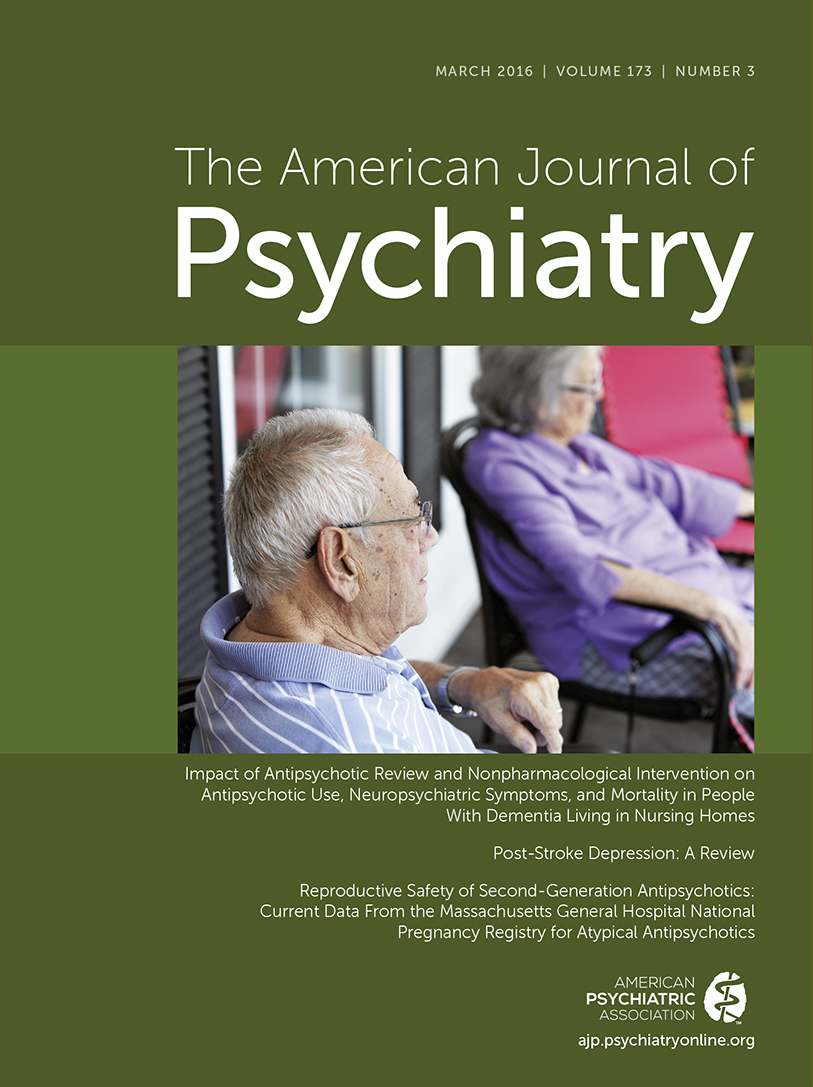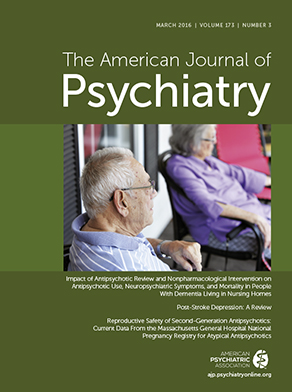Pregnancy, it turns out, is an “off-label” condition.
It has been 25 years since the National Institutes of Health (NIH) Office of Research on Women’s Health was founded to redress the dearth of health outcomes research in women. Since that time, to answer the need for science-based information on women’s health needs, the office has focused on ensuring the unbiased inclusion of NIH-sponsored clinical trials into women’s health research. In 2010, following a series of scientific regional workshops and public hearings, the office released a document titled, “Moving into the Future with New Dimensions and Strategies: A Vision for 2020 for Women’s Health Research” (
2). Among the objectives recognized and set forth was research on conditions affecting pregnant women and their effects on the subsequent health of women and their offspring. Of the more than four million women in the United States who give birth annually, many suffer from serious mental disorders, including depression, bipolar disorder, schizophrenia, and anxiety disorders. Nevertheless, there continues to be a lack of evidence-based research on the effects of psychiatric medications on the health of women and exposed offspring. Thus, the decision to treat pregnant women with psychotropic medications is often made by health care providers with little or no evidence-based data, and whose overriding concern is on the protection of the fetus, with far less consideration given to the health and well-being of the expectant mother (
1). As a result, despite suffering, pregnant women with psychiatric illness are often denied potentially effective treatment that may reduce both their suffering and the adverse effects of their illness on the health of their offspring. The placing of fetal concerns over those of the pregnant woman has been described as “cultural anxiety” (
3), and risk/benefit concerns often remain weighted heavily toward the safety of the fetus, ignoring the growing evidence that the health of the pregnant woman is connected inexorably to that of her fetus, and vice versa.
Thus, despite ample research that psychiatric illness during pregnancy increases the risk not only of maternal illness but also of obstetrical complications and adverse fetal outcomes (
4–
11), clinicians continue to be wary of prescribing psychotropic medications to pregnant women. Fortunately, over the past 2 decades, there has been considerable progress supporting the relative safety and efficacy of antidepressant use in pregnancy (particularly selective serotonin reuptake inhibitors), as well as research bringing attention to the risks of the use of mood stabilizers such as lithium, sodium valproate, and carbamazepine in pregnancy. However, there has been a lag in research on the use of antipsychotic agents (specifically newer second-generation antipsychotics, or atypical antipsychotics) in pregnancy. These agents are now frequently prescribed to treat primary psychotic illnesses such as schizophrenia, as well as bipolar disorder, and as augmenting agents for treatment-resistant major depressive disorders. At times, atypical antipsychotics have also been administered off-label to address debilitating anxiety and sleep deprivation. Clinicians and their patients need to have access to information that will enable them to weigh the possible effects of untreated or undertreated illness on mother and baby against those of second-generation antipsychotics.
In this issue of the
Journal, Cohen and colleagues report on data prospectively derived from the National Pregnancy Registry for Atypical Antipsychotics, based at Massachusetts General Hospital (
12). Recognizing the rigor and design of this registry, the Food and Drug Administration (FDA) has included it in the List of Pregnancy Exposure Registries (
13). Although preliminary, the results of the study are encouraging and suggest that second-generation antipsychotics as a group are not major teratogens, unlike sodium valproate, which is often used to treat bipolar disorder and incurs an approximate 10% risk of neural tube defects. The registry, which continues to collect data, reports on results of 214 pregnant women exposed to a second-generation antipsychotic and an internal comparison group of 89 women with psychiatric illness who were not exposed to the studied agents. Medical records, obstetric records, labor and delivery data, and pediatric documentation (from birth to 6 months) were obtained, and malformations were reviewed by an independent, blinded dysmorphologist. There were three major malformations in the exposed group compared with one major malformation in the control group, constituting an absolute risk of major malformations of 1.4% for exposed infants and 1.1% for nonexposed fetuses, and translating to an odds ratio of 1.25 (95% CI=0.13–12.19). The numbers are somewhat small and the confidence limits are rather wide. However, because atypical antipsychotics are so often used to treat major mental disorders and so little is known about their effects in pregnancy, the findings obtained and released thus far are important as they contribute to an emerging body of data that may be used for informed decision-making for pregnant women for whom such agents are likely to be helpful. As more patients are enrolled in this ongoing study, additional information will be added, providing further data and conclusions. As noted by the authors, these results suggest that, in pregnant women with serious psychiatric illnesses, the use of second-generation antipsychotics may be a better option than avoiding these agents and thus exposing both women and their fetuses to the adverse consequences of maternal illness.
While primary data from controlled prospective studies that definitively eliminate confounding by indication is undoubtedly the gold standard for eliciting evidence-based data, ethical and other concerns limit the likelihood that such data will be forthcoming. Thus, rigorously collected, prospective, and controlled registry information such as that presented by Cohen and colleagues is an important source for health care providers and their patients to facilitate informed decision-making.
Recognizing the need for clear information on the reproductive safety of prescription drugs, as of June 2015, the FDA replaced the previously overly simplistic, and often outdated and confusing letter-labeling with the Pregnancy and Lactation Labeling Rule, which will be updated as new information becomes available (
14). The FDA has stipulated that scientifically based pregnancy registries (such as the Massachusetts General Hospital National Pregnancy Registry for Atypical Antipsychotics) are an important source of such information and that when such registry-based data are available, the data are included in the pregnancy subsection of product labeling.
The close and mutual connection between the pregnant woman and her fetus means that what affects her affects her fetus, and this connection extends well beyond pregnancy. Thus, pervasive mental illness in a mother has adverse effects on her health and the well-being of her fetus and baby. Maternal mental illness is a risk factor for mental health and substance use problems in offspring that extend well beyond infancy throughout childhood and adolescence (
15). This is surely true for women with psychiatric symptoms that are so debilitating that antipsychotic agents are needed for adequate treatment and relief of suffering. Informed decision-making will benefit greatly from scientifically based data and conclusions derived from carefully constructed, controlled, prospective registries, as endorsed and included in prescribing information by the FDA. In this vein, the FDA has widely disseminated to consumers and to health care providers information about the new pregnancy and lactation labeling system and has encouraged participation in pregnancy exposure registries, thereby improving their accessibility to health care providers and their patients (
16–
18). The Massachusetts General Hospital National Pregnancy Registry for Atypical Antipsychotics provides a standard for how registry research should be conducted and resulting information disseminated as enrollment increases and more data accrue.

